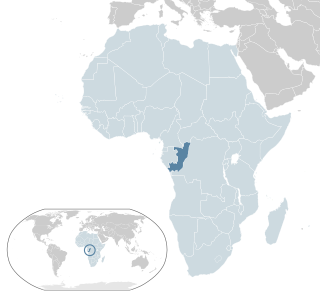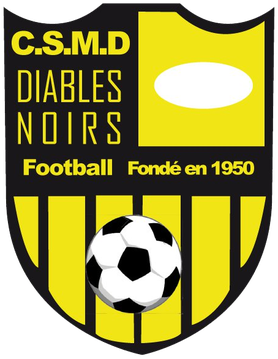
Brazzaville is the capital and largest city of the Republic of the Congo. Administratively, it is a department and a commune. Constituting the financial and administrative centre of the country, it is located on the north side of the Congo River, opposite Kinshasa, the capital city of the Democratic Republic of the Congo.
An arrondissement is any of various administrative divisions of France, Belgium, Haiti, certain other Francophone countries, as well as the Netherlands.

Pointe-Noire is the second largest city in the Republic of the Congo, following the capital of Brazzaville, and an autonomous department and a commune since the 2002 Constitution. Before this date it was the capital of the Kouilou region. It is situated on a headland between Pointe-Noire Bay and the Atlantic Ocean. Pointe-Noire is the main commercial centre of the country and has a population of 1,420,612 inhabitants in 2023.

Dolisie, known as Loubomo between 1975 and 1991, is a city and a commune. It is the capital of Niari in the south western of the Republic of the Congo, the country's third largest city and an important commercial centre. The city lies on the eastern edge of the coastal rainforest and has a population of 117,920.

The Second Republic of the Congo Civil War, also known as the Second Brazzaville-Congolese Civil War, was the second of two ethnopolitical civil conflicts in the Republic of the Congo which lasted from 5 June 1997 to 29 December 1999. The war served as the continuation of the civil war of 1993–1994 and involved militias representing three political candidates. The conflict ended following the intervention of the Angolan military, which reinstated former president Denis Sassou Nguesso to power.

Club Sportif Multidisciplinaire Diables Noirs or simply CSMD Diables Noirs is a Congolese football club based in Brazzaville.

Poto-Poto is one of the urban arrondissements (boroughs) of the city of Brazzaville, capital of the Republic of the Congo.
The Citizen Rally is a political party in the Republic of the Congo. The party was founded in March 1998 and its President is Claude Alphonse Nsilou, who has served in the government since 2002.
Bernard Bakana Kolélas was a Congolese politician and President of the Congolese Movement for Democracy and Integral Development (MCDDI). Kolélas was a long-time opponent of the single-party rule of the Congolese Labour Party (PCT), and after the introduction of multiparty politics in the early 1990s he was one of Congo-Brazzaville's most important political leaders. He placed second in the August 1992 presidential election, behind Pascal Lissouba; subsequently he was mayor of Brazzaville, the capital, during the mid-1990s, and he briefly served as Prime Minister of Congo-Brazzaville during the 1997 civil war. After rebel forces prevailed in the civil war, he lived in exile for eight years until an amnesty made it possible for him to return; he was then elected to the National Assembly in 2007.
Claude Alphonse Nsilou is a Congolese politician who has served in the government of Congo-Brazzaville as Minister of Trade since 2017. Previously he was Minister of Construction, City Planning, and Housing from 2002 to 2017. He is the President of the Citizen Rally (RC).
Ouenzé is one of the arrondissements of Brazzaville, capital of Republic of Congo. It is located in the north of the capital. Brazzaville is divided into seven arrondissements, or districts: Makélékélé (1), Bacongo (2), Poto-Poto (3), Moungali (4), Ouenzé (5), Talangaï (6) and Mfilou (7). The population is about 1000 residents. Most of residents are educated. They speak French, Lingala and Kituba.
Dominique Ntsiété was a Congolese politician. A member of the Congolese Labour Party (PCT), he served in the Senate of Congo-Brazzaville from 2002 to 2012.

La Sape, an abbreviation based on the phrase Société des Ambianceurs et des Personnes Élégantes and hinting to the French slang word sape which means "clothes" or sapé, which means "dressed up", is a subculture centered on the cities of Kinshasa and Brazzaville in the Democratic Republic of the Congo and Republic of Congo respectively. An adherent of La Sape is known as a sapeur or, if female, as a sapeuse. The movement embodies the elegance in style and manners of colonial predecessor dandies.
The following is a timeline of the history of the city of Brazzaville, Republic of the Congo.

Madibou is one of the arrondissements of Brazzaville, capital of Republic of Congo.
Makélékélé is one of the arrondissements of Brazzaville, capital of Republic of Congo.

Mfilou is the seventh arrondissements of Brazzaville, capital of Republic of Congo.
Moungali is one of the arrondissements of Brazzaville, capital of Republic of Congo.
Talangaï is one of the arrondissements of Brazzaville, capital of Republic of Congo.
Djiri is one of the arrondissements of Brazzaville, capital of Republic of Congo.









